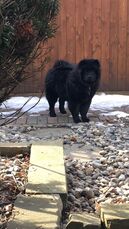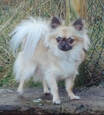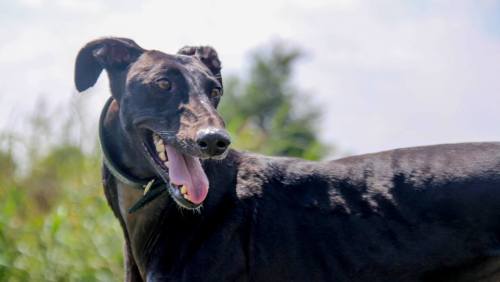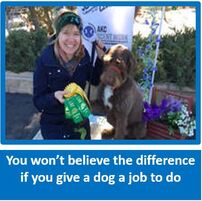
Some breeds are more prone to separation anxiety than others, and it is a good idea to find out if your cross breed is one of the breeds more prone to separation anxiety as you can then take steps to prevent this occurring. Additionally, finding out your dogs breed makeup will satisfy your curiosity (important) and you will come to understand why it does certain things, as well as becoming aware of health and genetic concerns which are breed related, common behaviour concerns etc. Do visit our website, and if you have any questions, don't hesitate to ask us!
Breeds Less Likely to Develop Separation Anxiety
Scotty Valadao - Canine Behaviourist - Friends of the Dog
Scotty Valadao - Canine Behaviourist - Friends of the Dog
The other day, we supplied you with an article as to which dog breeds are more prone to separation anxiety and here we want to give you an idea as to which breeds are better suited to spending time alone.
We suggest that each and every dog, right from puppyhood, and reinforced throughout its life, it taught to spend time alone - regardless of the breed.
However, no matter what breed you decide on, it is imperative that you teach the dog that spending time alone is not stressful and can actually be rewarding due to special toys left while owner is out, scent games and other mental stimulation that can be supplied. What we do suggest where these toys are concerned, is they are only given when the owner is out - that way they take on a lot more importance and can change the dogs perception of being left alone to a much more positive one. Bringing in games that stimulate the mind, such as dog puzzles, scent games, interactive toys in the home such as the Foobler also offer the mental stimulation that makes a dog a much happier one in general.
Additionally, if a dog gets a lovely walk at least 4 times a week, it is going to be much happier to spend time sleeping or entertaining itself while you are out. When it comes to walks, it is not necessary to supply a daily run of half an hour, in fact, a slow walk of about fifteen minutes, where the dog can smell all the scents and find out the 'news' in the local neighbourhood, is much more mentally satisfying and balances serotonin levels, than a 30 minute jog with owner, with virutally no scenting occurring.
Also, bear in mind that dogs are crepuscular - this means that they are more likely to be active when the sun goes down (hence the 'zoomies' late afternoon!) so taking them for a ten minute walk before you go to work can work, can work wonders, as too does a lovely walk with you when you get home.
What else we have in our favour, is that adult dogs, will sleep about 12 - 14 hours in a 24 hour period - many dogs sleep happily while their owners are out, which does make our own lives much easier! However, this does not mean we abuse this - ensure that the physical, mental and social stimulation that a dog needs are supplied.
The Breeds Most Suitable
These breeds are based on my own experience over 20 years, as well as that of other behaviourists - combined, and then averaged. This list is just that, a list - the breeds are not listed in order of being more suitable to spending time alone.
As a matter of interest, in overseas websites both the Boston Terrier, the French Bulldog, Chihuahua, and the Pug, are mentioned to be less likely to develop separation anxiety. However, that is not our own experience, perhaps it is something to do with the breeding in South Africa. On average these breeds tend to both demand attention from their owner and become very needy and we have had multiple sessions with clients due to separation anxiety in the above breeds.
We suggest that each and every dog, right from puppyhood, and reinforced throughout its life, it taught to spend time alone - regardless of the breed.
However, no matter what breed you decide on, it is imperative that you teach the dog that spending time alone is not stressful and can actually be rewarding due to special toys left while owner is out, scent games and other mental stimulation that can be supplied. What we do suggest where these toys are concerned, is they are only given when the owner is out - that way they take on a lot more importance and can change the dogs perception of being left alone to a much more positive one. Bringing in games that stimulate the mind, such as dog puzzles, scent games, interactive toys in the home such as the Foobler also offer the mental stimulation that makes a dog a much happier one in general.
Additionally, if a dog gets a lovely walk at least 4 times a week, it is going to be much happier to spend time sleeping or entertaining itself while you are out. When it comes to walks, it is not necessary to supply a daily run of half an hour, in fact, a slow walk of about fifteen minutes, where the dog can smell all the scents and find out the 'news' in the local neighbourhood, is much more mentally satisfying and balances serotonin levels, than a 30 minute jog with owner, with virutally no scenting occurring.
Also, bear in mind that dogs are crepuscular - this means that they are more likely to be active when the sun goes down (hence the 'zoomies' late afternoon!) so taking them for a ten minute walk before you go to work can work, can work wonders, as too does a lovely walk with you when you get home.
What else we have in our favour, is that adult dogs, will sleep about 12 - 14 hours in a 24 hour period - many dogs sleep happily while their owners are out, which does make our own lives much easier! However, this does not mean we abuse this - ensure that the physical, mental and social stimulation that a dog needs are supplied.
The Breeds Most Suitable
These breeds are based on my own experience over 20 years, as well as that of other behaviourists - combined, and then averaged. This list is just that, a list - the breeds are not listed in order of being more suitable to spending time alone.
As a matter of interest, in overseas websites both the Boston Terrier, the French Bulldog, Chihuahua, and the Pug, are mentioned to be less likely to develop separation anxiety. However, that is not our own experience, perhaps it is something to do with the breeding in South Africa. On average these breeds tend to both demand attention from their owner and become very needy and we have had multiple sessions with clients due to separation anxiety in the above breeds.
 Pic - C. du Toit
Pic - C. du Toit
Basset Hound
On average one of the most laid back breeds around - however that is not always the case, a lot depends on the dog's personality. Charmaine, co-founder of FOTD, a wonderful friend, and a fellow behaviourist, has a Basset and a Beagle, and Shelby her Basset, is way more energetic that her Beagle!
In addition to being laid back and self-sufficient, a well bred Basset is normally very even-tempered, relaxed and a happy dogs, and does well with other dogs and is good with kids.
They were originally bred to go after small prey, so be careful with cats and other small criters, as a Basset that has caught the scent of something, is not always that good about coming back! It is always an idea to teach a really reliable recall. Just because it is laid back does not mean it does not enjoy a few walks a week - and the more time that is spent scenting, the happier a Basset is.
Do leave scent games in the garden when you are out as well as lovely chew toys and odds are that your Basset will be very happy spending time at home while you are out at work.
On average one of the most laid back breeds around - however that is not always the case, a lot depends on the dog's personality. Charmaine, co-founder of FOTD, a wonderful friend, and a fellow behaviourist, has a Basset and a Beagle, and Shelby her Basset, is way more energetic that her Beagle!
In addition to being laid back and self-sufficient, a well bred Basset is normally very even-tempered, relaxed and a happy dogs, and does well with other dogs and is good with kids.
They were originally bred to go after small prey, so be careful with cats and other small criters, as a Basset that has caught the scent of something, is not always that good about coming back! It is always an idea to teach a really reliable recall. Just because it is laid back does not mean it does not enjoy a few walks a week - and the more time that is spent scenting, the happier a Basset is.
Do leave scent games in the garden when you are out as well as lovely chew toys and odds are that your Basset will be very happy spending time at home while you are out at work.
 Pic - Chow Rescue
Pic - Chow Rescue
Chow Chow
The Chow is incredibly independent, and is often described as being 'cat like' - aloof and likes to do its own thing! It also tends to choose one person in the family to be 'its' person, and can be intimidating towards strangers and often ignores other family members if it is not in the mood to interact - definitely not the dog to hug and cuddle. Due to its aloof attitude, lots of puppy and early and continued socialisation will help with this aspect. They can also be stubborn when it comes to learning, tending to do things on 'their terms and their time', so find out what motivates your Chow and use that for training.
They do need reasonable exercise, and if supplied are happy to spend time alone at home while owner is at work and is one of the dogs that is more suitable to staying in a townhouse or complex.
The Chow is incredibly independent, and is often described as being 'cat like' - aloof and likes to do its own thing! It also tends to choose one person in the family to be 'its' person, and can be intimidating towards strangers and often ignores other family members if it is not in the mood to interact - definitely not the dog to hug and cuddle. Due to its aloof attitude, lots of puppy and early and continued socialisation will help with this aspect. They can also be stubborn when it comes to learning, tending to do things on 'their terms and their time', so find out what motivates your Chow and use that for training.
They do need reasonable exercise, and if supplied are happy to spend time alone at home while owner is at work and is one of the dogs that is more suitable to staying in a townhouse or complex.
|
Greyhound
When one thinks about a Greyhound, it is more with a picture in mind of a dog running flat out chasing a mechanical rabbit, rather than a dog lying quietly at home! The truth of the matter is that a Greyhound does need exercise, and if you can find an area where it can really run free, the happier it will be and ideally walks every day - in between, this lovely dog, is happy to lie and sleep at home - they tend to be lazy! On average they are friendly to both other dogs and people. If children are in the home, rather older children as they may get knocked over. |
|
Chinese Shar-Pei
Just like the Chow, the Shar-Pei was originally bred as a guard dog and pit fighter, so it is protective of its family and not particularly friendly to people and other dogs, although on average, it is better than the Chow. Due to the above, puppy school and continued socialization are a necessity. They absolutely love their families and do tend to be protective of them. Their energy levels are not very high, and due to their short noses do tend to overheat, so walks when it is cool suit them best. |
 Pic - Chihuahuas rescue
Pic - Chihuahuas rescue
Chihuahuas
On the opposite end of the spectrum are Chihuahuas, weighing in at about 6 pounds. They’re smart, playful, easy to train and have an average energy level.
If you’ve come into contact with aggressive Chihuahuas before, it’s typically because they’re not trained and socialized from an early age. Make sure to do so, and your tiny dog should do fine around kids and strangers.
Give your Chihuahua regular exercise before and after work because these dogs’ little bodies are prone to gaining weight if not managed well.
On the opposite end of the spectrum are Chihuahuas, weighing in at about 6 pounds. They’re smart, playful, easy to train and have an average energy level.
If you’ve come into contact with aggressive Chihuahuas before, it’s typically because they’re not trained and socialized from an early age. Make sure to do so, and your tiny dog should do fine around kids and strangers.
Give your Chihuahua regular exercise before and after work because these dogs’ little bodies are prone to gaining weight if not managed well.
Lhasa Apso
These lovely little dogs do not require excessive exercise, and as they tend to be independent as well, are happy spending time at home alone. Due to their independent nature, they can be a bit challenging to train, so the owner needs to look for what really motivates their dogs, and also keep training short and sweet, so that the dog does not go into ' i have had enough' mode!
These lovely little dogs do not require excessive exercise, and as they tend to be independent as well, are happy spending time at home alone. Due to their independent nature, they can be a bit challenging to train, so the owner needs to look for what really motivates their dogs, and also keep training short and sweet, so that the dog does not go into ' i have had enough' mode!
|
Bull mastiff
The exact opposite in size to the Lhasa above, these stunning dogs are very calm and affectionate with their family members, however, can be rather intimidating towards strangers, so early and continued socialising, combined with training is always recommended. Despite their huge size, they really do not need much exercise, and are happy to lie about at home. As most people know, townhouses have certain breeds they prefer, normally the smaller breeds, if only they realizsed that a Bullmastiff or Greyhound are a lot less likely to cause problems and suffer from separation anxiety that the typical Jack Russell! |
The above gives you a good idea, however, do your own research into any breed you are considering. Don't just rely on the internet, the best places to find out are the following:-
Finally, regardless of the breed, do engage in the Alone Time exercises from when your pup comes home, so that you help to build a confident dog that not only is happy to spend time alone, it views this as a positive experience - Article link below.
- As your vet and vet nurse, plus ask them if they can put you in touch with clients with the particular breed you are looking at.
- Speak to breed rescue - this is always a good avenue for information. The people running these are passionate about their particular breeds and know them well.
- Speak to breeders - remember there are breeders and breeders. Your best bet is breeders registered by KUSA, however KUSA only checks on the dogs papers, not the manner in which it is brought up or kennelled. As a safeguard, do read Responsible Breeding on our Puppy Page and have a look at other articles about breeders and adopting - unfortunately the responsibility to ensure the breeder is top notch and has the dogs interest at heart is yours!
- Speak to behaviourists and dog trainers and get their opinion. These are the people that can give you a lot of information as to separation anxiety and also other behaviour problems that various breeds are prone too.
Finally, regardless of the breed, do engage in the Alone Time exercises from when your pup comes home, so that you help to build a confident dog that not only is happy to spend time alone, it views this as a positive experience - Article link below.







